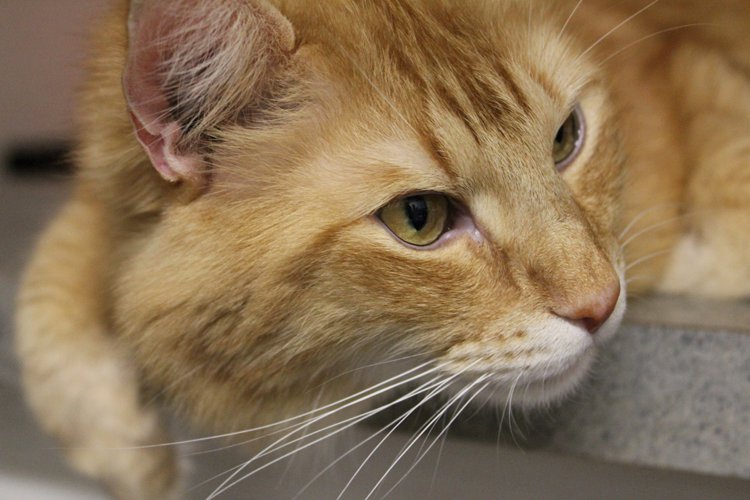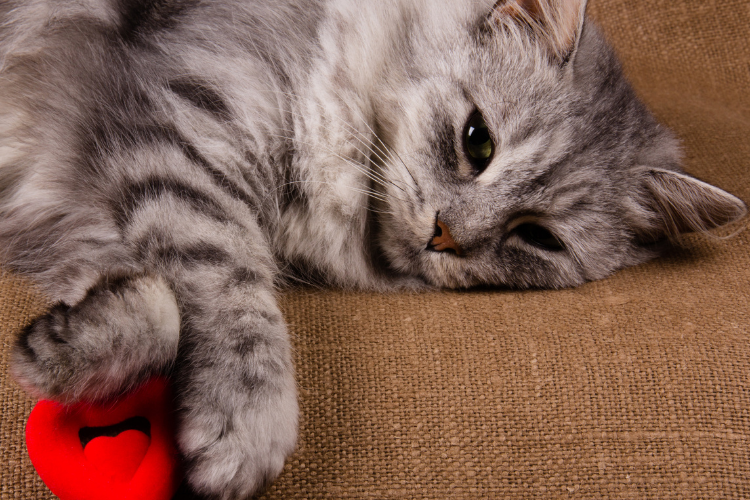Are you prepared to recognize congestive heart failure in your cat? While it’s relevant to discuss right now, during National Pet Wellness Month, CHF can happen at any time, and it’s important to know the signs in order to catch it early and give your kitty the best life they can have.
What is CHF?
Congestive heart failure is, simply, when the heart cannot pump blood well throughout the body. When the heart is not pumping as well as it should be, fluid can build up in different parts of the body, eventually resulting in fluid on the lungs as it backs up. This is a chronic condition that can worsen over time – usually a period of six to eighteen months – eventually resulting in a difficult decision for many pet owners.
Causes of CHF
When it comes to congestive heart failure in cats, there are any number of causes. It could result from congenital heart disease, physical malformations in the heart, an overactive thyroid, anemia, high blood pressure, or even tumors.
The most common cause of congestive heart failure, however, is HCM or hypertrophic cardiomyopathy – this is when one of the heart’s ventricles (usually the left ventricle) becomes so thickened that it stops the heart from correctly pumping. A ventricle is one of the two main chambers of the heart, and obviously super important to the circulation of blood throughout your cat’s body. Many vets are unsure what causes this thickening, some suspecting it’s hereditary, while some of the above causes of CHF can cause HCM as the beginning of heart failure.
Symptoms of CHF
There is a strong, standard list of symptoms that can indicate congestive heart failure (or heart failure of another type) in cats:
- Lethargy – Does your cat seem to be weak and staying inactive?
- Poor Circulation – Are your cat’s gums grey? Do their extremities feel cold?
- Difficulty Breathing – Is their breathing labored? Are they breathing fast, but not panting?
- Fast Heart Rate – Is their heart rate staying elevated?
- Coughing/Vomiting – Are they coughing a lot? Or vomiting for no reason?
- Swollen Abdomen – Do they have a swollen abdomen, potentially indicating fluid buildup?
- Collapse/Paralysis – Have they collapsed or fainted? Are their hindquarters paralyzed?
- Weight Loss – Any significant weight change?
These symptoms don’t always guarantee a diagnosis of heart failure, but any of them can mean a serious medication condition is at work, and you should get your cat in to see a vet right away.
Treatment Options
As with humans, there are several treatment options if your cat is suffering from congestive heart failure, depending on how acute it is.
If it’s severe with heavy fluid build-up and your cat has terrible difficulty breathing, they may need to drain the fluid and/or do oxygen therapy. This could require hospitalization.
At home, throughout your cat’s progression with congestive heart failure, there are several types of medications that your vet may prescribe. These prescriptions may help your cat’s heart rate slow down, or take pressure off the heart by making its contractions weaker. They may also prescribe diuretics to lessen fluid build-up.
Of course, one of the best treatment options for CHF is to make sure your cat has regular vet check-ups – catching CHF in its early stages is key to helping your cat live as long and healthy a life as possible with the condition.
Other Conditions that Can Mimic Symptoms
Asthma in cats actually looks somewhat like CHF, because many of the symptoms overlap.
An asthmatic cat will have difficulty breathing periodically, which may be accompanied by coughing. They also may spend time breathing rapidly with their mouths open. Vomiting is another symptom. They can even get grey gums or tongue if the asthma is severe enough.
Honestly, this emphasizes how important it is to keep a regular schedule of vet visits. Our cat, Tiger Jack, was asthmatic for his entire life. When he was diagnosed with CHF this summer, we had long discussions with our vet about why we didn’t see this coming – and he explained that, with Tiger being an asthmatic cat, we wouldn’t have recognized the symptoms as anything out of the ordinary for him. We didn’t realize he had CHF until it was well-advanced and most treatment options didn’t make sense for his quality of life.
Congestive heart failure is a progressive condition, and there’s no curing it once your cat has it. It could be genetic or environmental, but it happens. As always, keep your kitties happy with good diets, low stress, and plenty of regular vet visits so any serious medical conditions come to light early. It’s easier to see this coming, and enjoy the last months with your cat with your eyes open.









